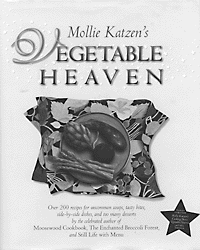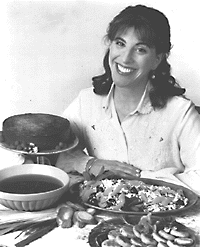Thoroughly Modern Mollie
A Vegetarian Cookbook Author Takes Broccoli to the 21st Century
By Marion Winik, Fri., Nov. 28, 1997
|
|
"I started cooking in restaurants -- actually in a department store coffeeshop -- when I was 15, but I never planned a culinary career. I wanted to be a pianist, a painter, and a writer. I saw cooking as a trade that could be a source of income until my paintings were hanging in the Met," she jokes. But shortly after she earned her B.F.A. from the San Francisco Art Institute, working her way through school at the now-defunct but then-cutting-edge restaurant Shandygaff, her brother and some friends came to visit. After tasting the curries and pestos and stir-fries she was dishing up, they persuaded her to return to Ithaca, New York with them to help open a restaurant.
The three months Katzen planned to spend in Ithaca turned into five years. In addition to literally helping build Moosewood and working there every day, she took on the task of recording cooking instructions for use by members of the collective, to standardize the preparation of the carrot-lentil loaf, Ukrainian poppyseed cake, Brazilian black bean soup, and other signature dishes. The hand-lettered, illustrated recipe journal she created for this purpose was in fact the first edition of the Moosewood Cookbook. Cutting the quantities to make the book useful for patrons and parents of her vegetarian friends, Katzen went on to self-publish the volume -- and sold 5,000 copies out of her station wagon over the next few years. Then she met Phil Wood, founder of then-fledgling Ten Speed Press.
"At this time, 1977, there were only a very few vegetarian cookbooks in print," Katzen explains passionately, those expressive eyebrows on the move. "There was no Laurel's Kitchen, no Greens: only Anna Thomas' Vegetarian Epicure, Francis Moore Lappe's Diet for a Small Planet, The Deaf Smith Cookbook, and The New York Times Natural Foods Cookbook. It was just wide open. But Phil had the idea that natural foods were about to become a trend; he thought we could sell as many as 50,000 books over the next five years. Well... that was 20 years ago, the books have sold over 3.5 million copies, and Ten Speed has become one of the major cookbook publishers in the country." She flashes that big white-toothed smile.
As she speaks, I realize I've fallen into a bit of a reverie. It was that list of books -- I could see the tattered covers, feel the stain-stiffened pages, smell the spilled garlic and curry powder. Even the typefaces of the recipes swam before my eyes. I became a vegetarian at the age of 12 in 1970, and after I got sick of eating the bizarre mixture of vegetables, tomato sauce, and raisins I used to fry up every night in my mother's kitchen -- after I went off to college and moved into a vegetarian co-op house -- these books, along with Moosewood, were my bibles.
Perhaps like a family bible, a beloved cookbook is more than a book; it is a totem of one's personal history. All the times you've consulted it, the dishes you've prepared and their occasions, the recipes preferred by this boyfriend, that housemate, these children. The kitchens it has moved in and out of. The counters and shelves it's inhabited. To get rid of a cookbook signifies a major life transition. I remember the day Vegetarian Epicure became too complicated, Small Planet too ascetic. Moosewood I could never give up. There was always something special to me about it: its hospitable, unfussy gemütlichkeit, its helpful sidelong comments, its groovy pictures, neat hand-lettering, and low-key femininity. When I got my first copy, as a teenager, it was what I wanted to be when I grew up; I make the black bean soup and vegetarian chili even now.
So of course I've schlepped it to Las Manitas today for Katzen to sign. Though I confess that I don't use it quite as much as I used to. "All that sour cream and ricotta - "
"But you've got to get the new edition," Mollie scolds. "I redid both it and Broccoli Forest, retested and revised every single recipe so they would make sense for the way we eat now. The eggs and the dairy products -- pfft. And I redid all that lettering. It took me five years!"
What is the way we eat now, according to Katzen? She believes that vegetarianism has survived a great many dangerous trends: the "kitchen sink style," in which no ingredient list was too long; the "hippie style," of unbearably weird herbs and spices; and the "purist phase": "I will die before I used a canned bean." "I'm not a crusader," she says. "I don't think everyone should be vegetarian, and Vegetable Heaven is certainly not a book about `vegetarianism'. Vegetarianism is about not eating meat. For me, it's not about Not Meat. It's about Yes, Vegetables. It's about loving meatless dishes.
"If I were really hungry and all there was to eat was a chicken sandwich, I'd eat it. I'm not going to starve myself. And I don't feel that it would somehow change who I am. People project this attitude onto me. Listen, when Moosewood opened in '73, we cooked a meat dish every night. We thought we had to. But it was always the one thing left over." She imparts this information while sipping delicately at Las Manitas' caldo de pollo. "Some people, if they saw me eating this chicken soup, they would say, `Oh my God! What's she doing?'"
While it contains no recipes with meat, Vegetable Heaven reflects Katzen's belief that eating should be about sensuality and pleasure, not about "isms" or neurotic nutritional obsessions. There are no "numerics," no fat and calorie counts after each recipe; instead, she offers preparation times, both total and actual `work.' As she explains in the introduction, the book shows the evolution of her cooking in three ways. First, she is finally free of `center of the plate' thinking, in which a big hunk of something (meat or otherwise) dominates the meal, and some less-important `side dishes' go along for the ride. Her new way of eating is to prepare two or three compatible dishes which share the stage. She is also committed to short ingredient lists (amen!) and to flavoring with herbs, spices, chiles, oils, and cooking techniques rather than adding richness with butter, cream, and cheese.
 Asked about the Moosewood Restaurant cookbooks which have come out in the past few years, she explains that back when The Moosewood Cookbook became a hit and she left to pursue a full-time cookbook-writing career, she had a falling-out with the other members of the collective. "They were jealous and angry about the cookbook, there was legal stuff, finally a settlement. They got the name, which was tough because I felt I'd made that name very valuable and now I don't get to use it. But at this point, there's nothing to be mad about. They're selling a whole lot of books and so am I. And for the record, let me say that they are very, very good cooks and their books are excellent."
Asked about the Moosewood Restaurant cookbooks which have come out in the past few years, she explains that back when The Moosewood Cookbook became a hit and she left to pursue a full-time cookbook-writing career, she had a falling-out with the other members of the collective. "They were jealous and angry about the cookbook, there was legal stuff, finally a settlement. They got the name, which was tough because I felt I'd made that name very valuable and now I don't get to use it. But at this point, there's nothing to be mad about. They're selling a whole lot of books and so am I. And for the record, let me say that they are very, very good cooks and their books are excellent."
In her introduction to the revised edition of Moosewood -- which I ran out and got immediately after our lunch -- Katzen explains how doing that original recipe journal made her rethink the mental distinction she had made between "art" (i.e., painting, music, literature) and the less elevated act of cooking and serving food. "The boundary between food and officially `creative' work began to blur," she writes. And now? "To be of use, to have the opportunity to impart information and skills that enrich people's daily lives -- this is what is most important to me."
Now that we're both moms and writers, Mollie Katzen and I seem much closer in age than we did when I was a teenager reading her book. But I have to say: She is still what I want to be when I grow up.









